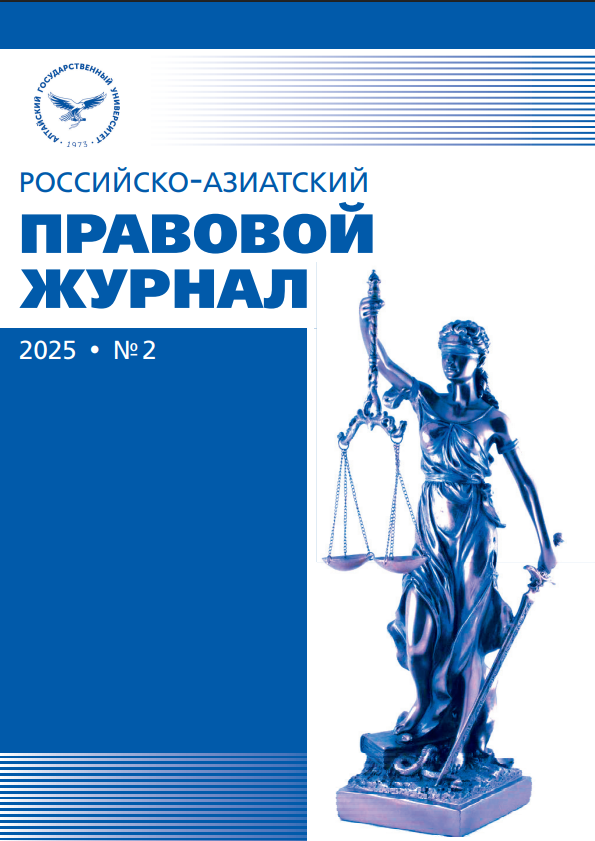ELECTRONIC EVIDENCE IN CIVIL PROCEEDINGS ON THE EXAMPLE OF LABOR DISPUTES WITH REMOTE WORKERS
УДК 347.94:004.62 ББК 67.410.204.19
Abstract
In the 21st century, digitalization is penetrating all areas of our lives, bringing changes both to the dailyroutine and to key aspects of social activities. Every year our world is more and more enveloped by thenetwork of digital technologies, changing the way people live, methods of work, social relations and the lawin general. Today's changes in the field of labor lead to the fact that electronic evidence often becomes a keyelement in resolving disputes, having the opportunity to provide an objective picture of events. With the helpof digital evidence, it becomes possible for the court to obtain an objective idea of the events and actions of the parties, which significantly increases the effectiveness and fairness of justice. However, with the advent ofnew technologies, new difficulties arise associated with the legal regulation of the use of electronic evidence. Inthe article, the author analyzes some problems in the field of legal regulation of the use of electronic evidencein civil proceedings, law enforcement practice, and also proposes ways to improve legislation in this area.Conclusions are drawn about the need to separate electronic evidence into separate types, as well as to expandthe circle of persons capable of certifying electronic evidence
Downloads
References
2. Вехов В.Б. Электронные доказательства: проблемы теории и практики // Правопорядок: история, теория, практика. 2016. №4 (11). URL: https://clck.ru/3ABoLk (дата обращения: 20.04.2024).
3. Гройсберг А.И. Электронные доказательства в системе правосудия по гражданским делам // Вестник гражданского процесса. 2019. №2. URL: https://urfac.ru/?p=2120 (дата обращения: 14.04.2024).
4. Саликова Н.М., Батухтина Е.М. Электронный документ как доказательство: проблемы использования при разрешении трудовых споров // Российское право: образование, практика, наука. 2020. №4. URL: https://clck.ru/3AMJwU (дата обращения: 28.04.2024).
5. Будылин С.Л. Электронное сообщение как документ и доказательство // Закон. 2014. №10.
6. Лаптев В.А., Чуча С.Ю. Нотариально удостоверенные доказательства в судебном процессе: теория и правоприменительная практика // Вестник гражданского процесса. 2023. №1. URL: https://clck. ru/3AAm3M (дата обращения: 19.04.2024).
7. Методические рекомендации по обеспечению доказательств нотариусами (утв. решением Правления ФНП, протокол от 26.06.2023 №10/23). URL: https://clck.ru/3AMJ5F (дата обращения: 28.04.2024).
8. Пономаренко А.В. Электронные доказательства в гражданском процессе // Нацразвитие. Наука и образование. 2022. №1 (4). URL: https://clck.ru/39tnts (дата обращения: 06.04.2024).
9. Новицкий В.А., Новицкая Л.Ю. Понятие и виды цифровых доказательств // Ленинградский юридический журнал. 2019. №1. URL: https://clck.ru/39vxTw (дата обращения: 08.04.2024).
REFERENCES
1. Boriskina N.I. Electronic evidence in the civil proceedings // Legislation. 2018. №4. P. 58–63.
2. Vekhov V.B. Electronic evidence: Problems of theory and practice // Law and order: history, theory, practice. 2016. №4 (11). URL: https://clck.ru/3ABoLk (access date: 20.04.2024).
3. Groysberg A.I. Electronic evidences in the system of justice in civil cases // Herald of civil procedure. 2019. №2. URL: https://urfac.ru/?p=2120 (access date: 14.04.2024).
4. Salikova N.M., Batukhtina E.M. Electronic document as evidence: problems of use in resolving labour disputes // Russian law: education, practice, science. Russian law: education, practice, science. 2020. №4. URL: https://clck.ru/3AMJwU (access date: 28.04.2024).
5. Budylin S.L. Electronic message as a document and evidence // Law. 2014. №10.
6. Laptev V. A., Chucha S. Y. Notarially certified evidence in the judicial process: theory and law enforcement practice // Vestnik Civil Process. 2023. №1. URL: https://clck.ru/3AAm3M (access date: 19.04.2024).
7. Methodical Recommendations on the provision of evidence by notaries (approved by the decision of the Board of the FNP, Minutes of 26.06.2023 №10/23). URL: https://clck.ru/3AMJ5F (access date: 28.04.2024).
8. Ponomarenko A.V. Electronic evidence in the civil process// Natsrazvitie. Science and education. 2022. №1 (4). URL: https://clck.ru/39tnts (access date: 06.04.2024).
9. Novitskiy V.A., Novitskaya L.Y. The concept and types of digital evidence // Leningrad Law Journal. 2019. №1. URL: https://clck.ru/39vxTw (access date: 08.04.2024).
Copyright (c) 2025 Ю. Е. Василенко

This work is licensed under a Creative Commons Attribution 4.0 International License.
Russian-Asian Law Journal is a golden publisher, as we allow self-archiving, but most importantly we are fully transparent about your rights.
Authors may present and discuss their findings ahead of publication: at scientific conferences, on preprint servers, in public databases, and in blogs, wikis, tweets, and other informal communication channels.
Russian-Asian Law Journal allows authors to deposit manuscripts (currently under review or those for intended submission) in non-commercial, pre-print servers such as ArXiv.
Authors who publish with this journal agree to the following terms:
- Authors retain copyright and grant the journal right of first publication with the work simultaneously licensed under a Creative Commons Attribution License that allows others to share the work with an acknowledgement of the work's authorship and initial publication in this journal.
- Authors are able to enter into separate, additional contractual arrangements for the non-exclusive distribution of the journal's published version of the work (e.g., post it to an institutional repository or publish it in a book), with an acknowledgement of its initial publication in this journal.
- Authors are permitted and encouraged to post their work online (e.g., in institutional repositories or on their website) prior to and during the submission process, as it can lead to productive exchanges, as well as earlier and greater citation of published work (See The Effect of Open Access).








